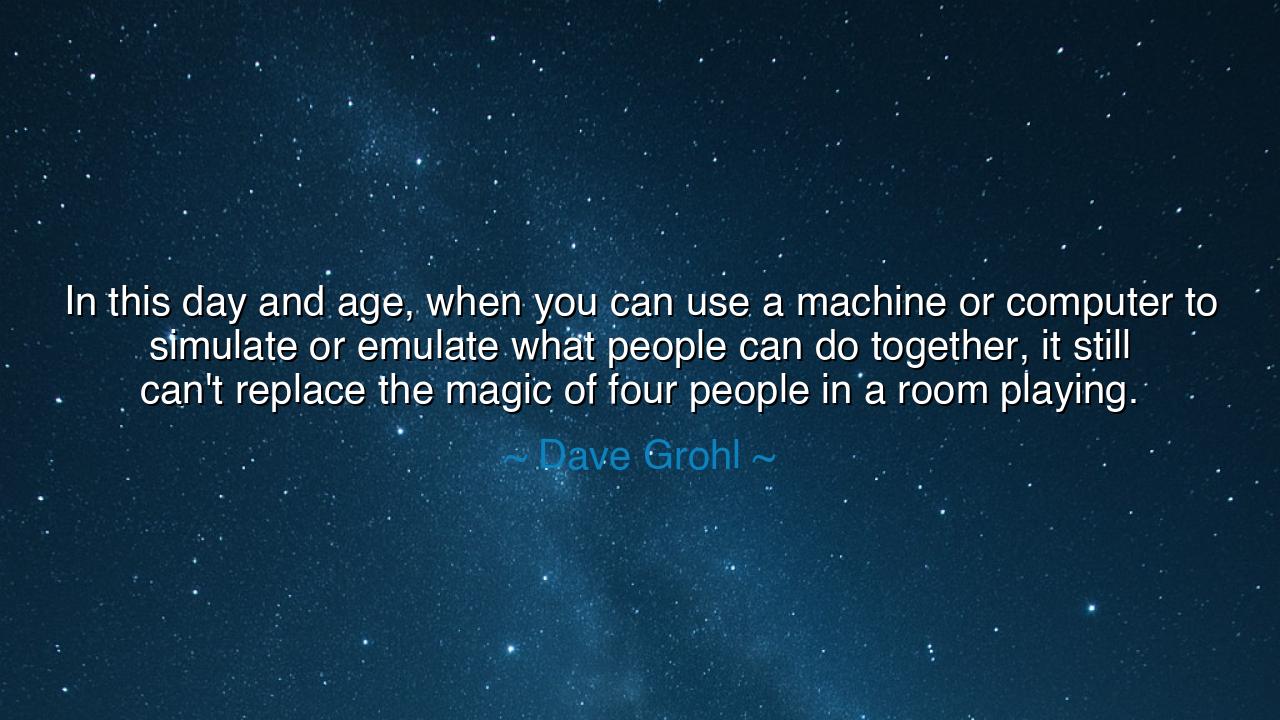
In this day and age, when you can use a machine or computer to
In this day and age, when you can use a machine or computer to simulate or emulate what people can do together, it still can't replace the magic of four people in a room playing.






The musician and poet of sound, Dave Grohl, once declared with the conviction of one who has lived the truth of his art: “In this day and age, when you can use a machine or computer to simulate or emulate what people can do together, it still can’t replace the magic of four people in a room playing.” In this statement lies a wisdom that reaches beyond music — a truth about creation, connection, and the spirit that breathes life into all human endeavor. It is a defense of the human soul in an age of machinery, a reminder that while technology can replicate rhythm and tone, it cannot summon the pulse of life that flows only when hearts beat together in the same space.
The origin of this quote springs from Grohl’s lifelong devotion to the raw, unfiltered power of live music. Born from the furnace of rock and roll, shaped in the chaos of the band Nirvana and later the spirit of the Foo Fighters, he witnessed firsthand the evolution of sound from analog to digital, from living rooms to laptops. Yet through all his fame and progress, Grohl remained rooted in the simple, sacred truth that music’s greatest power lies in human unity — in the trembling energy that arises when individuals gather, instruments in hand, and lose themselves in the communion of sound. His words are a call to remembrance: that technology may enhance creation, but it must never replace connection.
What Grohl calls “the magic of four people in a room playing” is not merely music — it is alchemy. It is the mysterious transformation that occurs when separate souls merge into one voice. No machine, no matter how advanced, can emulate the shared glance between musicians, the instinctive timing, the subtle rise and fall of energy as each person feels the pulse of the others. In that moment, ego dissolves, and something larger takes form — the spirit of collaboration, the fire of creation itself. This is not merely performance; it is communion. It is the essence of what makes art, and indeed humanity, divine.
History bears witness to this truth. Consider the Beatles, who began in humble rooms of Liverpool, their instruments secondhand, their amplifiers modest. Yet together, through laughter, friction, and the joy of shared purpose, they created sounds that would change the world. Their recordings, though now remastered by modern technology, were born not from perfection, but from presence — the sweat, the breath, the pulse of four souls locked in rhythm. When they played together, the music was alive, unpredictable, transcendent. When they separated, each remained brilliant, but the magic — that living, breathing fire — was never the same. Grohl’s words echo this truth: the greatness of art does not arise from tools, but from togetherness.
The meaning of Grohl’s statement reaches far beyond the studio. In every field of human endeavor, we find the same temptation: to let machines replace human touch. We see it in art, in education, in conversation. Screens connect us yet separate us; algorithms imitate creativity but lack the warmth of inspiration. The modern age, in its brilliance, risks forgetting that creation is not efficiency — it is emotion. The machine can mimic form, but not feeling. It can process data, but not meaning. Grohl’s words are a cry from the heart — a call to remember that the greatest things we make are born not from solitude or circuitry, but from shared humanity.
It is a noble truth, yet one easy to forget. The machine does not grow weary, but neither does it love. It never stumbles, yet it never surprises. When people gather to create — to make music, to build, to dream — there is risk, imperfection, and chaos. But within that chaos lies the seed of greatness. For in every trembling note, in every shared heartbeat, there is life. The power that flows between individuals united in purpose cannot be coded or programmed; it can only be lived. It is the eternal magic of human connection, the same force that built civilizations, wrote symphonies, and carved beauty from stone.
The lesson, then, is clear: cherish the human element in all that you do. Do not surrender your craft, your friendships, your passions to the convenience of the machine. Gather others; create together; let imperfection become your glory. If you are a musician, play with your friends. If you are a thinker, converse face to face. If you are an artist, share the room with those who understand your struggle. For the spark that leaps from heart to heart — that invisible thread of empathy and energy — is what gives all creation its soul.
Thus remember, O seeker of harmony, that technology may serve you, but it must never own you. The machine can emulate, but it cannot feel; it can replicate, but it cannot dream. The true magic — the one Grohl speaks of — lives in the meeting of spirits, in the laughter between notes, in the unity of imperfect souls striving toward beauty. In this day and age, let the world be filled again with rooms of four people playing — and may their music, born of flesh and fire, remind us all that to create together is to be truly alive.






AAdministratorAdministrator
Welcome, honored guests. Please leave a comment, we will respond soon